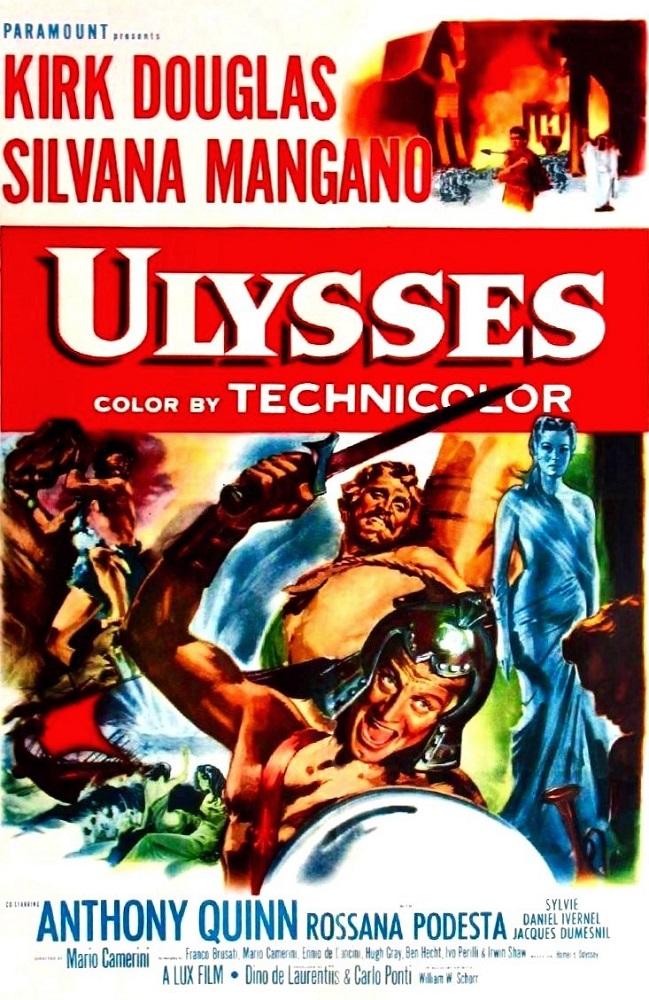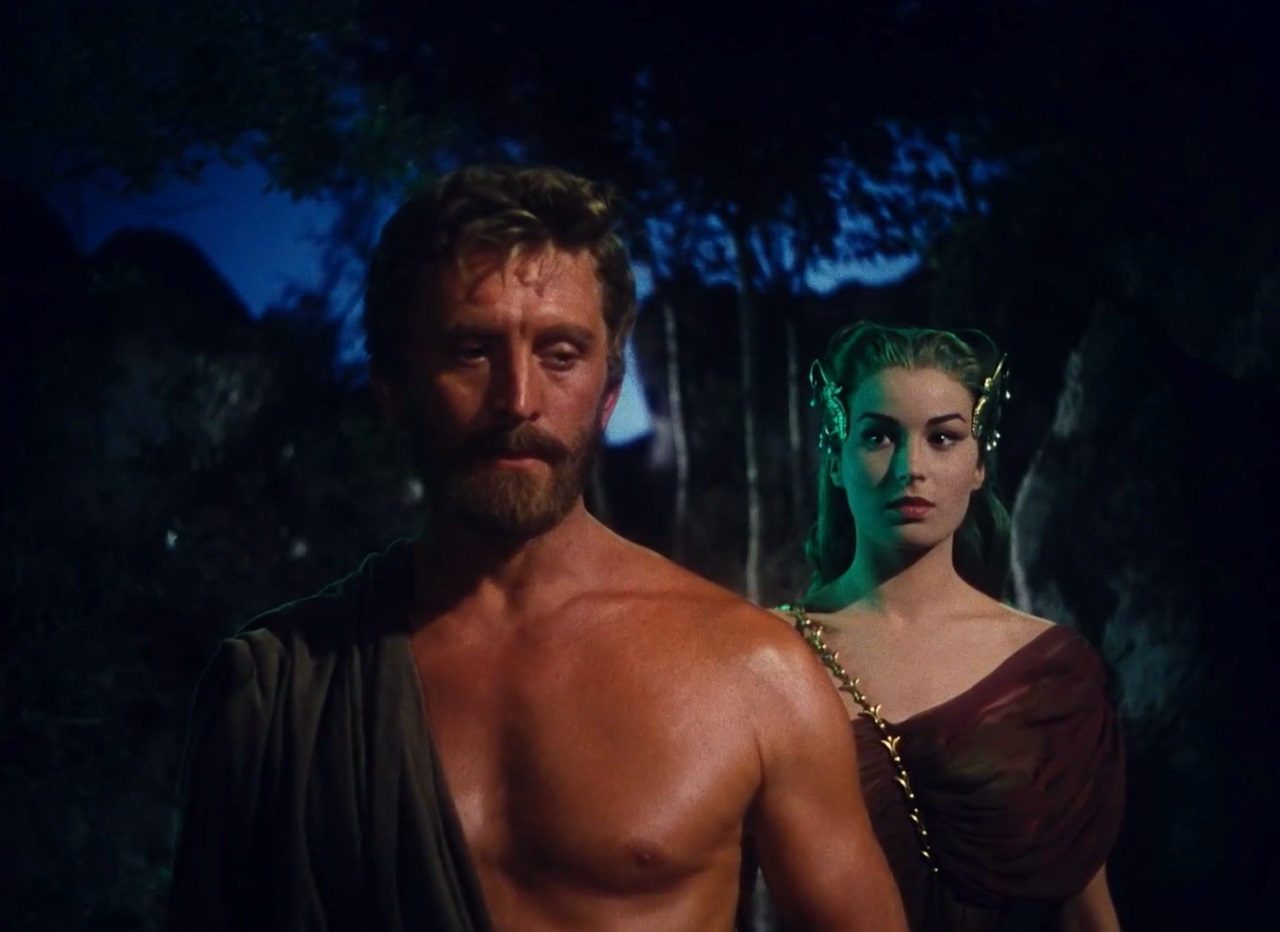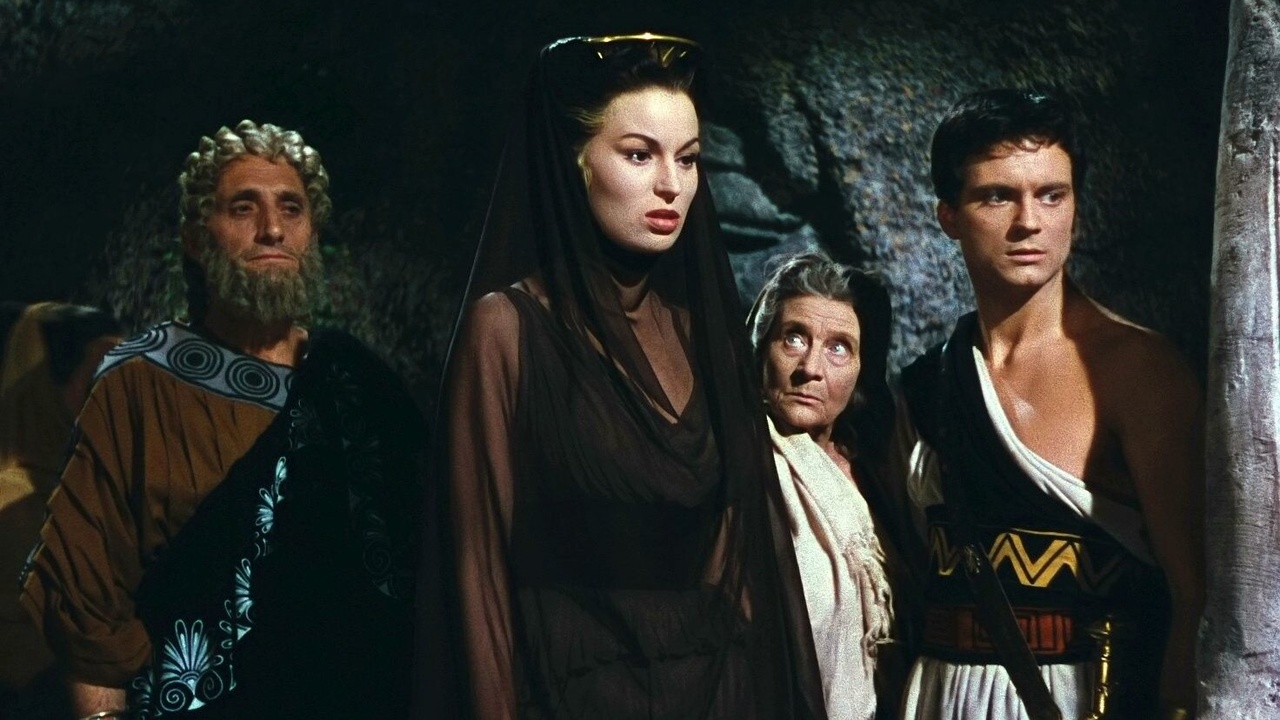
(Ulisse)
Italy. 1954.
Crew
Director – Mario Camerini, Screenplay – Franco Brusati, Mario Camerini, Ennio De Concini, Hugh Gray, Ben Hecht, Ivo Perilli & Irwin Shaw, Producers – Dino de Laurentiis & Carlo Ponti, Photography – Harold Rosson, Music – Alessandro Cicognini, Special Effects – Eugen Shuftan, Production Design – Flavio Morgherini. Production Company – LVX Film/Ponti-De Laurentiis.
Cast
Kirk Douglas (Ulysses), Silvana Mangano (Penelope/Circe), Franco Interlinghi (Telemachus), Anthony Quinn (Antinoos), Rossana Podesta (Nausicaa), Jacques Dusmenal (King Aliconous), Umberto Silvestri (Polyphhemus), Evi Maltagliati (Ulysses’ Mother), Daniel Invernal (Eurylochus), Elena Zareschi (Cassandra)
Plot
Ulysses, the king of Ithaca, has been away fighting the war in Troy for ten years. Back in Ithaca, his wife Penelope is beset by boorish suitors camped out in the courtyard of their home, entreating her to remarry them, while planning divide the spoils of Ulysses’ fortune amongst themselves. Ulysses meanwhile is in Phaenicia where he has been found washed up on a beach with no memory. He has been made a guest by the king Aliconous, whose daughter Nausicaa has become endeared with Ulysses’ fighting ways and wants to marry him. Gradually, Ulysses starts to recall his memory of the adventures he and his men underwent returning home from Troy. Variously they were made prisoners of the giant cyclops Polyphemus who wanted to eat them; passed through the straits where the calls of the mermaids tried to draw them into peril; and ended up on the island of the sorceress Circe who used her enchantments to make Ulysses stay and be hers.
The Odyssey is one of the oldest works of literature, a poem that dates from the 8th Century B.C. Both The Odyssey and the earlier The Iliad are attributed to Homer. Almost nothing is known about who Homer was, while modern scholars tend to the view that the two works were written by different people. The Iliaid describes the story of the siege of Troy, while The Odyssey tells the story of King Odysseus, one of the combatants at Troy, and his ten year journey back home where he is beset by many magical and mythological encounters. Ulysses was the name that was given to Odysseus when the Roman appropriated the Greek myths.
There have been assorted film versions of The Odyssey with the Italian-made tv mini-series The Odyssey (1968), the Hallmark tv mini-series The Odyssey (1997), The Asylum’s low-budget Troy: The Odyssey (2017) and The Return (2024) with Ralph Fiennes as Odysseus, a non-fantastic telling that concentrates on his final return to Ithaca, while the Coen Brothers loosely updated it to The Depression era in O Brother, Where Art Thou? (2000). Christopher Nolan has promised a new big screen adaptation for 2026. Mostly, fantastic cinema has tended to pillage Greek Mythology and transplant isolated characters such as the Cyclops, the sirens and Circe out of their context into new surroundings.
I had always assumed that Ulysses was one of the earliest of the Italian Peplum films. The Peplum, more commonly known as the Sword and Sandal film, was a genre that took off following the international success of the Italian-made Hercules (1958) starring Steve Reeves. The success of Hercules begat a whole series of Italian adventure films featuring body builders playing mythic heroes such as Hercules, Samson, Goliath, Ulysses, Atlas and Ursus. Most of these were made on the cheap side. By contrast, Ulysses is a far more earnest fantasy film that directly adapts the Greek myth and is much better budgeted than most of the peplum. Crucially, it features a regular Hollywood actor Kirk Douglas as opposed to a lead drawn from a bodybuilding background.

Ulysses was mounted as a lavish production during its day. It has on board two of the top producers of this era – Carlo Ponti and Dino de Laurentiis de Laurentiis went on to produce The Bible (1966), Danger: Diabolik (1967) and Barbarella (1968) before setting up shop the US in the 1970s and making a whole heap of productions including the remakes of King Kong (1976) and Flash Gordon (1980), Dune (1984), several Stephen King adaptations and the first Hannibal Lecter film Manhunter (1986), among a good many others. Carlo Ponti married Sophia Loren and placed her through a series of films of the era, as well as producing other works like Doctor Zhivago (1965) and The Tenth Victim (1965). Imported has been US scriptwriter/novelist Ben Hecht who wrote a number of classic screenplays including Scarface (1932), Gunga Din (1939), Wuthering Heights (1939), Spellbound (1945), Notorious (1946) and Kiss of Death (1947), along with the Catholic films The Miracle of the Bells (1948) and Miracle in the Rain (1951).
The film is mounted with a lavishness when it comes to the sets and construction of full-size sailing ships and the like. Particularly good are the effects that allow the men to react with the giant-sized cyclops (Umberto Silvestri), where the opticals are overseen by no less than Eugen Shuftan who supervised the work on Metropolis (1927).
The various episodes of The Odyssey have been boiled down to three encounters – the story of the Cyclops and how Odysseus and his men are trapped in his cave and escape by getting him drunk and then blinding him; the encounter with the sirens (called mermaids here, although we never actually see any of them) and how the crew avoid their deadly call by plugging their ears with wax, while Ulysses has himself tied to the mast of the ship; the meeting with Circe who turns the crew into pigs and seduces Odysseus to stay; as well as a wraparound that very loosely adapts the tale of an amnesiac Odysseus in the land of the Phraecians.

Of the tales from The Odyssey it does tell, the film does so with reasonable faithfulness to the original stories. The film also gives quite reasonable strength to the wraparound story with Penelope beset by the suitors and Ulysses’ triumphant return at the end – the scene where Kirk Douglas slaughters all of them in the courtyard would have been quite strong stuff for the day.
Kirk Douglas had emerged as an actor in the 1940s after a stint in Wartime service. He rapidly became a star and had accrued two Academy Award nominations before this point. As Ulysses, he plays with a wired energy. Cast as both Ulysses’ wife Penelope and the sorceress Circe is Silvana Mangano (who was Dino de Laurentiis’s wife and a star in Italian cinema of the day). Mangano is beautifully outfitted and made up but comes across as a regal ice queen in both roles. Her eyes seem troubled and in terms of expressions, she never once smiles throughout, which seems more suited to the role of Circe but makes Penelope seem a stiff character.
Trailer here